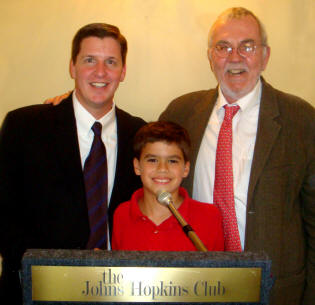|
October 4-7: Baltimore, MD
The Hartwell Foundation held its second Annual Meeting
Biomedical Research on October 4-7 in Baltimore, MD.
Thirty-six Hartwell Investigators (Classes from 2006,
2007 and 2008), represented 14 different centers of
excellence for biomedical research in the United States.
Each individual presented their ongoing research and
reviewed progress toward achieving research aims. With
the enthusiasm of scientists committed to ensuring that
practical benefits come to children from innovative,
early-stage, cutting-edge, biomedical research, Hartwell
Investigators revealed their notable triumphs,
occasional frustrations, as well as their solutions to
overcoming impediments. In the spirit of The Hartwell
Foundation, the non-competitive exchanges reflected how
collaboration and leveraging resources benefits
everyone.
All of the meeting participants enjoyed the broad scope
of innovative research being supported by The Hartwell
Foundation. Breakthroughs in understanding childhood
diseases caught everyone’s attention. Several notable
successes were reported, including advances in
management of blood flow within the brain of children
suffering brain trauma, new approaches for imaging and
assessing lung function in asthma, successful
"knifeless" surgery in utero to correct a heart defect,
and the delivery of drug-bearing nanoparticles to brain
tumors. Advances in tissue engineering, the development
of nano-devices to reduce risk of pneumonia, rapid
diagnostic tools for disease detection in neonates,
novel methods for high throughput drug candidate
screening and progress in understanding gene-disease
relationships were also among the highlights.
On the morning following two full days of scientific
presentations, everyone toured the Johns Hopkins
Computational Science and Engineering, a facility
designed to promote and foster interdisciplinary
cooperation in research and development within the
academic setting. Afterwards, everyone was treated to a
highly personal talk on innovation by 2003 Nobel
Laureatte Peter Agre, MD, from The Johns Hopkins
University, followed by a luncheon at the Faculty Club.
Of special significance at the luncheon was the
attendance of a young patient and his family who
benefited from advances for monitoring blood pressure
autoregulation in traumatic brain injury achieved by one
of the Hartwell Investigators.
The Hartwell Foundation seeks to inspire innovation and
achievement by offering individual scientists and
engineers an opportunity to develop solutions to
problems commonly perceived as too risky to fund by
conventional funding agencies, like the NIH. Through a
unique and selective process, the Foundation provides
financial support to stimulate discovery in early-stage
biomedical research that it hopes will benefit children
of the United States.
|
|

2006 Hartwell Investigator Ken
Brady, MD, with Mr. Larry Smead, Chairman of The
Hartwell Foundation and Ken's young patient, "Ben"
|

